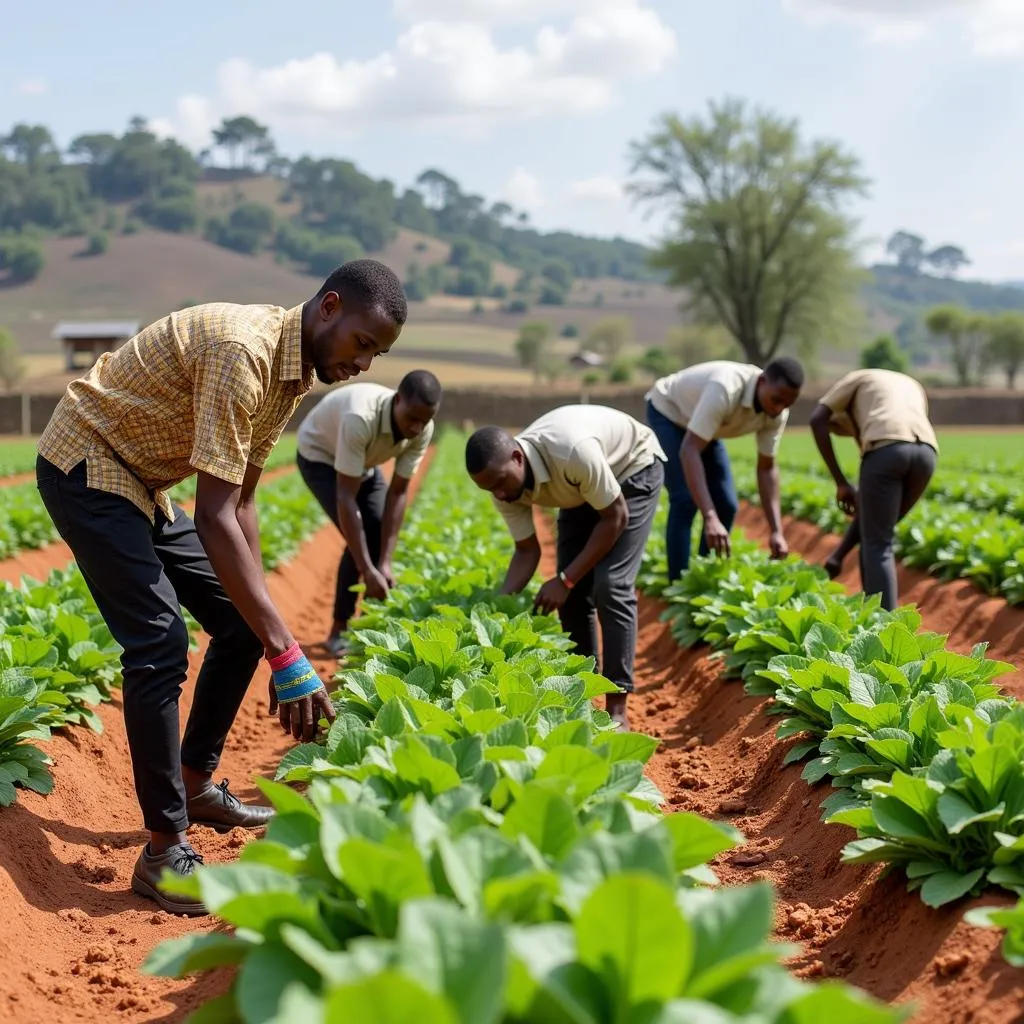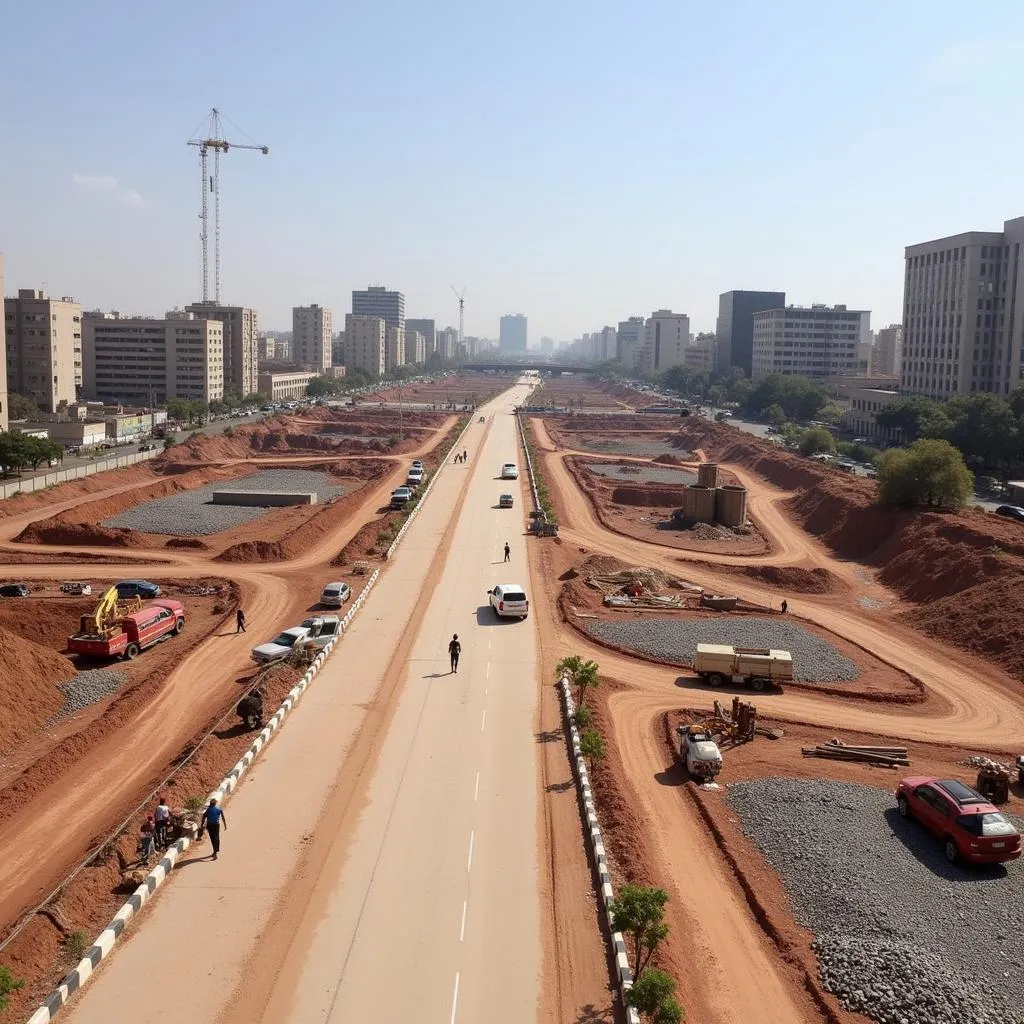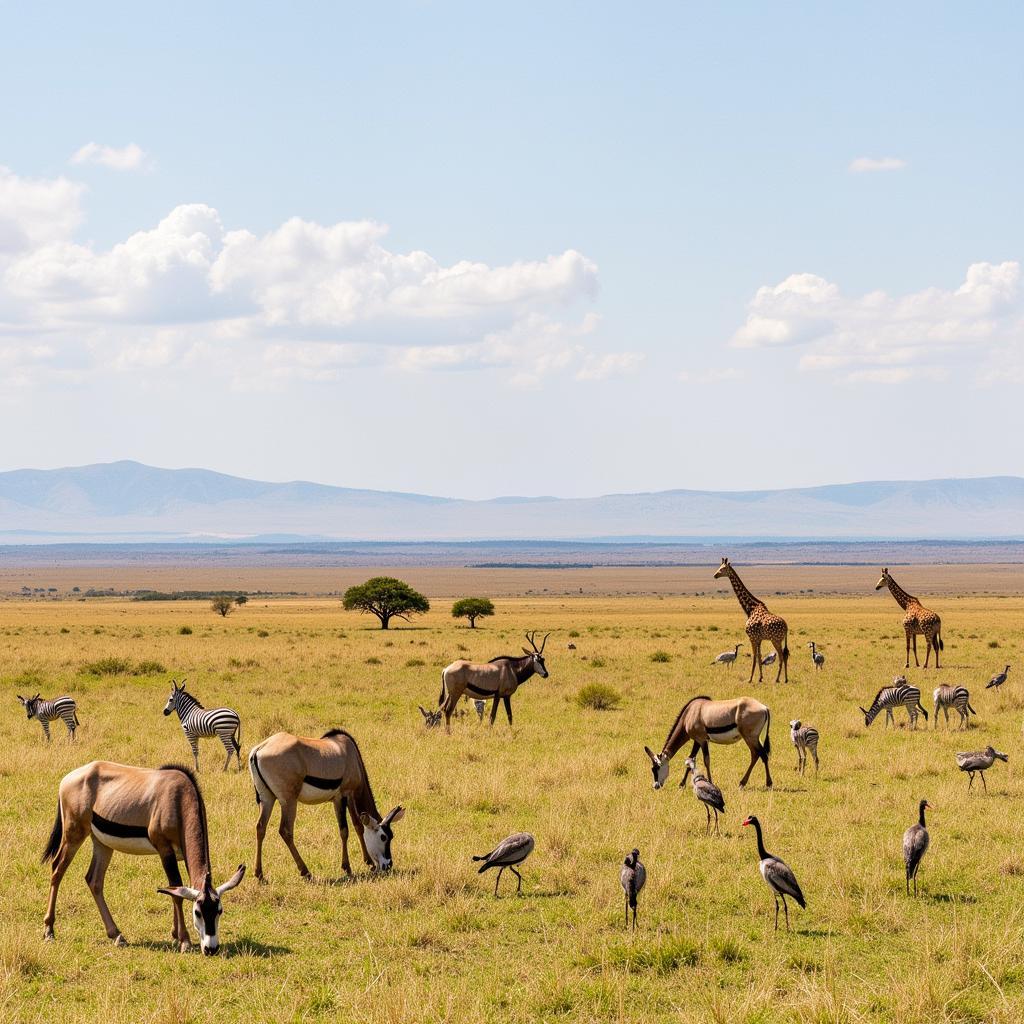The African Development Bank’s Impact on Ethiopia’s Development
The African Development Bank (AfDB) has played a crucial role in supporting Ethiopia’s development for decades, investing billions in key sectors like infrastructure, agriculture, and energy. This partnership has yielded significant results, contributing to economic growth, poverty reduction, and improved living standards for millions of Ethiopians.
Ethiopia’s Development Journey: A Partnership with the AfDB
Since its first project in Ethiopia in 1974, the AfDB has committed over USD 7 billion to supporting the country’s development agenda. This long-standing partnership reflects the bank’s unwavering commitment to fostering sustainable and inclusive growth in Africa, particularly in countries like Ethiopia with significant development needs.
 African Development Bank delegation meeting with Ethiopian officials
African Development Bank delegation meeting with Ethiopian officials
Key Areas of AfDB Engagement in Ethiopia
The AfDB’s work in Ethiopia focuses on several strategic areas crucial for sustainable development:
1. Infrastructure Development: Bridging the Gap
Recognizing that robust infrastructure is fundamental to economic growth, the AfDB has heavily invested in improving Ethiopia’s transport, energy, and ICT infrastructure. These investments aim to enhance connectivity, reduce transport costs, and facilitate trade, ultimately contributing to increased productivity and competitiveness.
- Transport: Funding for road and railway construction and rehabilitation projects, improving connections within Ethiopia and to neighboring countries.
- Energy: Supporting the development of renewable energy sources, such as hydropower and geothermal, to increase electricity access and promote green growth.
- ICT: Expanding broadband internet connectivity, particularly in rural areas, to bridge the digital divide and foster digital inclusion.
2. Agricultural Transformation: Cultivating Growth and Food Security
Agriculture is the backbone of Ethiopia’s economy, employing a significant portion of the population. The AfDB is actively involved in promoting agricultural transformation, aiming to enhance productivity, improve market access for smallholder farmers, and strengthen food security.
- Rural Finance: Providing access to credit and financial services for farmers, enabling them to invest in improved inputs, technologies, and post-harvest handling.
- Irrigation and Water Management: Investing in irrigation schemes and promoting efficient water management practices to enhance resilience to drought and climate change.
- Value Chain Development: Supporting the development of agricultural value chains, connecting farmers to markets and promoting agro-processing to increase incomes.
 Ethiopian farmers participating in an AfDB-supported training program
Ethiopian farmers participating in an AfDB-supported training program
3. Private Sector Development: Unlocking Ethiopia’s Potential
The AfDB recognizes the vital role of a vibrant private sector in driving economic growth and job creation. The bank provides support to Ethiopian businesses through:
- Lines of Credit: Extending credit lines to local banks to improve access to finance for small and medium-sized enterprises (SMEs).
- Technical Assistance: Providing technical assistance and capacity building programs to support the growth and competitiveness of Ethiopian businesses.
- Investment Climate Reforms: Supporting the government in implementing policies that create a conducive environment for private sector investment.
4. Human Capital Development: Investing in Ethiopia’s Future
Investing in people is crucial for sustainable development. The AfDB supports human capital development in Ethiopia by:
- Education: Funding the construction and rehabilitation of schools, particularly in rural areas, and supporting technical and vocational education and training (TVET).
- Health: Investing in health infrastructure, improving access to quality healthcare services, and supporting initiatives to combat diseases such as HIV/AIDS and malaria.
- Social Protection: Supporting social safety net programs to protect vulnerable populations from shocks and enhance their resilience.
The AfDB’s Impact: Success Stories and Future Directions
The AfDB’s engagement in Ethiopia has yielded tangible results, contributing to:
- Economic Growth: Supporting Ethiopia’s transition to a middle-income country, with sustained economic growth over the past two decades.
- Poverty Reduction: Contributing to a significant reduction in poverty rates, improving the lives of millions of Ethiopians.
- Infrastructure Development: Financing critical infrastructure projects, such as the Addis Ababa-Djibouti Railway, which has strengthened regional integration and boosted trade.
- Agricultural Transformation: Supporting agricultural productivity improvements, enhancing food security, and increasing incomes for farmers.
Looking ahead, the AfDB remains committed to supporting Ethiopia’s development aspirations. The bank’s future engagement will focus on:
- Promoting economic diversification and industrialization to create jobs and enhance the country’s competitiveness.
- Strengthening climate resilience through investments in climate-smart agriculture, renewable energy, and sustainable infrastructure.
- Deepening regional integration by financing cross-border infrastructure projects and promoting trade facilitation.
 Construction site of a new infrastructure project in Addis Ababa, Ethiopia
Construction site of a new infrastructure project in Addis Ababa, Ethiopia
Conclusion: A Partnership for Progress
The African Development Bank’s partnership with Ethiopia exemplifies its commitment to driving sustainable and inclusive development in Africa. Through its strategic investments and ongoing support, the AfDB is playing a critical role in unlocking Ethiopia’s potential and creating a brighter future for its people. The bank’s continued engagement will be essential in navigating the challenges and opportunities that lie ahead, ensuring that Ethiopia’s development journey remains on a path toward prosperity.
FAQ
1. What is the African Development Bank’s main objective in Ethiopia?
The AfDB aims to support sustainable and inclusive growth in Ethiopia by investing in key sectors like infrastructure, agriculture, and human capital development.
2. How does the AfDB support private sector development in Ethiopia?
The AfDB provides lines of credit to local banks, technical assistance, and supports investment climate reforms to foster a thriving private sector.
3. What is the significance of the AfDB’s investments in Ethiopia’s infrastructure?
Investing in transport, energy, and ICT infrastructure is crucial for connecting markets, reducing transport costs, and facilitating trade, ultimately boosting economic growth.
4. How does the AfDB contribute to climate resilience in Ethiopia?
The AfDB supports climate-smart agriculture, renewable energy projects, and sustainable infrastructure development to build resilience against climate change.
5. What are some notable successes of the AfDB’s partnership with Ethiopia?
The AfDB has contributed to Ethiopia’s economic growth, poverty reduction, infrastructure development, and agricultural transformation.
6. What are the future priorities of the AfDB in Ethiopia?
The AfDB will focus on promoting economic diversification, strengthening climate resilience, and deepening regional integration in its future engagement with Ethiopia.
7. How can I get more information about the AfDB’s work in Ethiopia?
You can visit the African Development Bank’s website or contact their Ethiopia Country Office.
Need More Information?
Explore our other insightful articles on African development:
- African countries with highest GDP
- African countries to develop climate-resilient agriculture systems
- African continent human
- African countries their capital and currency
- African countries by population and GDP
Do you have other questions about the African Development Bank’s work in Ethiopia or Africa in general?
Contact us:
Phone Number: +255768904061
Email: kaka.mag@gmail.com
Address: Mbarali DC Mawindi, Kangaga, Tanzania.
Our dedicated customer support team is available 24/7 to assist you.

